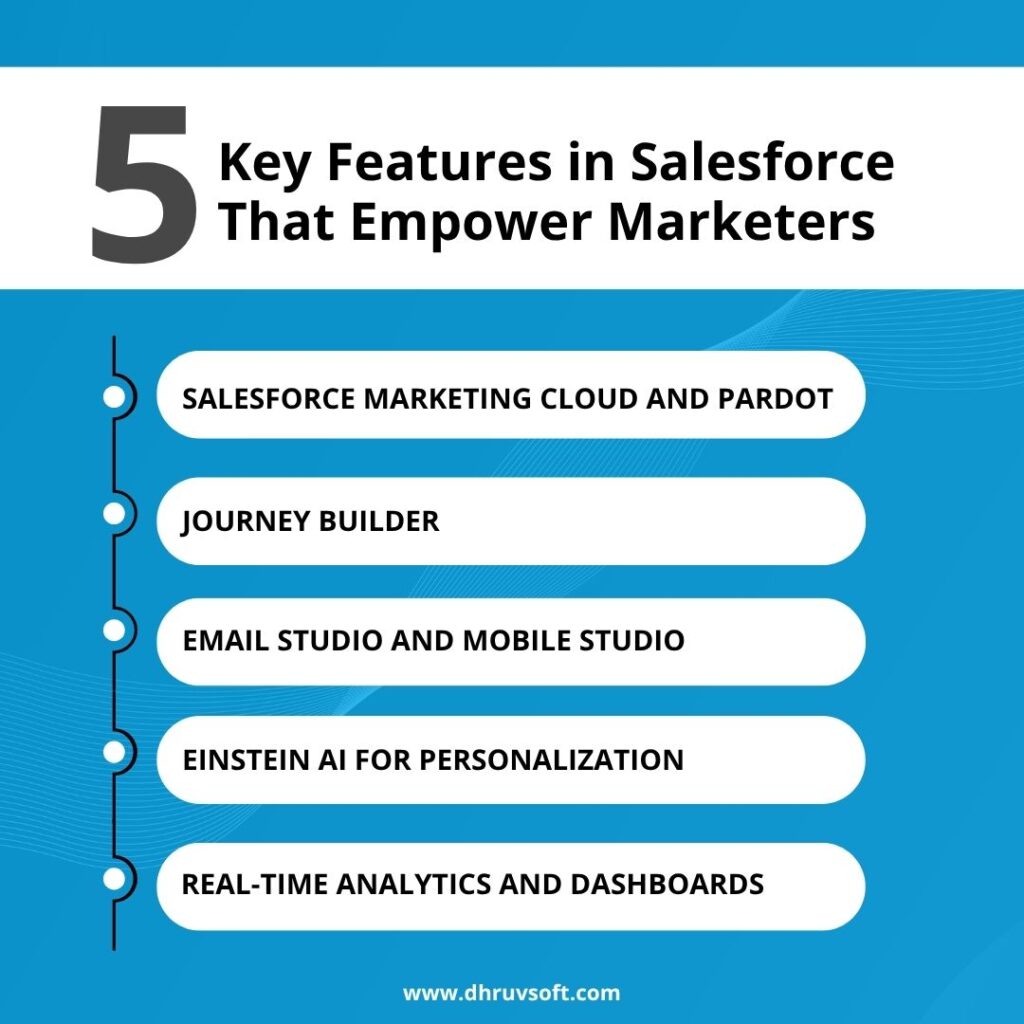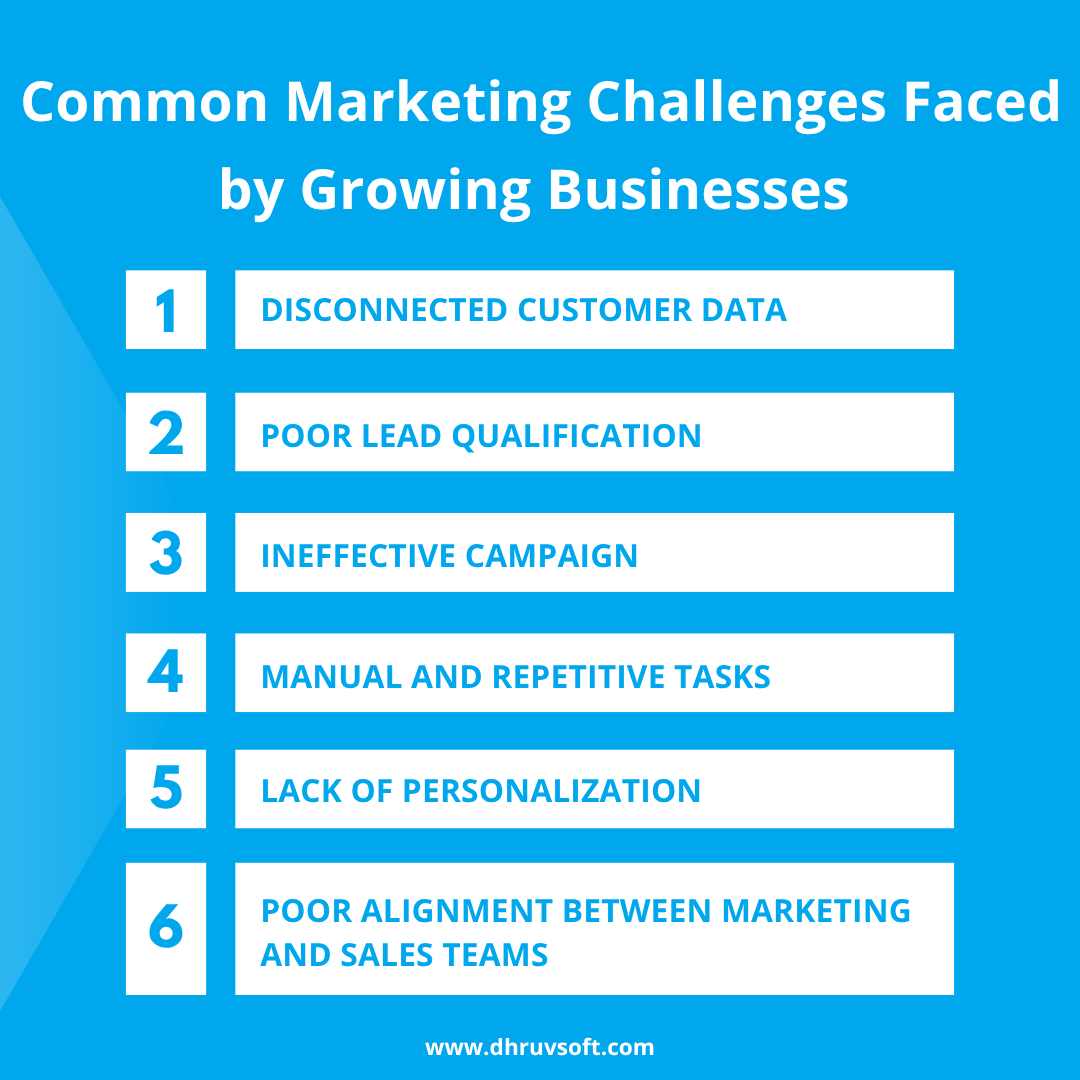
Marketing today isn’t what it used to be a few years ago. In today’s digital landscape, customers engage with companies through various channels, including social media, email, websites, messaging platforms, and other online interfaces.They expect fast responses, personalized experiences, and consistent communication.
Unfortunately, traditional marketing tools can’t keep up. They often operate in isolation, lack real-time insights, and offer limited automation. As a result, marketers struggle to manage leads efficiently, launch targeted campaigns, or measure ROI effectively.
That’s where Customer Relationship Management (CRM) software like Salesforce CRM and Salesforce Marketing Cloud step in. Salesforce isn’t just a sales tool; it’s a complete marketing enablement platform. It helps businesses unify customer data, automate campaigns, align marketing with sales, and deliver a personalized experience to each lead.
In this blog post, we’ll explore the top marketing challenges faced by growing businesses and explain how Salesforce CRM solves each of them, empowering your marketing team and boosting your bottom line.
Common Marketing Challenges Faced by Growing Businesses
Disconnected Customer Data
Marketing teams often operate with data scattered across different systems, email platforms, website analytics tools, social media dashboards, and more. Sales and support departments may also maintain their own separate data.
This lack of integration creates data silos. Marketers don’t have a 360-degree (or complete) view of the customer. They might send generic campaigns without understanding customer history, preferences, or behaviour, resulting in poor engagement and wasted resources.
Poor Lead Qualification
Not all leads are sales-ready. But without a system to score and qualify leads, marketers may end up forwarding cold or irrelevant leads to sales teams. This can frustrate the sales team and result in lost opportunities.
The inability to prioritise leads means that time is wasted nurturing people who are not likely to buy, while high-potential prospects may be overlooked.
Ineffective Campaign
You can’t improve what you can’t measure. Many businesses lack the tools to track marketing campaign performance across channels. They may not know which campaign generated which lead or what the ROI of a particular email campaign was.
This makes it hard to optimize strategy, justify budgets, or scale successful efforts. Without data-driven insights, marketing becomes guesswork.
Manual and Repetitive Tasks
Marketing teams spend a lot of time on tasks that could easily be automated, like sending follow-up emails, creating reports, and segmenting customer lists. These manual tasks are repetitive, time-consuming, and prone to human error.
When marketers are stuck doing manual work, they have less time to focus on strategy, creativity, and innovation.
Lack of Personalization
Today’s customers expect personalization. They want to feel like brands know them and can provide tailored content or offers. But without tools that allow you to segment users or personalise messages based on behaviour, marketers are forced to send generic messages.
This reduces open rates, click-throughs, and conversions because people tune out messages that don’t feel relevant to them.
Poor Alignment Between Marketing and Sales Teams
When marketing and sales teams don’t work together, leads often fall through the cracks. Sales might not follow up on the leads marketing generates. Marketing might not understand what kind of leads sales really wants.
This lack of shared goals, KPIs, and visibility causes tension and missed opportunities. For a business to grow, marketing and sales must be aligned and working toward the same outcomes.
How Salesforce CRM Solves These Marketing Challenges
Unified Customer View
Salesforce CRM integrates data from all your marketing channels, website visits, social media, emails, chats, and calls into a centralised platform. This creates a 360-degree view of every customer, giving marketers the full picture.
With Salesforce Customer 360, you can track customer interactions, preferences, and history in real-time. This helps deliver more personalized and timely campaigns while empowering teams with accurate, up-to-date data.
Lead Scoring and Qualification with Artificial Intelligence (AI)
Salesforce uses Einstein AI to automatically score leads based on behaviour, engagement, and demographics. It helps identify which leads are most likely to convert, so you can prioritise them for follow-up.
With Marketing Cloud, you can create automated nurturing journeys for different lead segments. Warm leads get the attention they need, while cold leads are nurtured with helpful content until they’re ready to convert.
Campaign Automation and Analytics
Salesforce allows you to run omnichannel marketing campaigns from a single dashboard. Whether it’s email, SMS, social, or web push, everything is integrated.
Real-time dashboards and analytics provide visibility into open rates, clicks, engagement, and ROI. You can track exactly which campaigns are performing well and optimize them on the go. No more guessing, just actionable data.
Workflow Automation
Salesforce’s Process Builder and Flow tools let you automate common tasks. Want to send a welcome email when a prospect signs up on a web form? Auto-assign a lead to a sales rep based on region? Generate weekly performance reports?
All of this and more can be automated, reducing manual work and saving time. Your marketing team can then focus on content, strategy, and innovation instead of routine admin tasks.
Intelligent Segmentation and Personalization
With Salesforce Marketing Cloud, you can create personalized journeys for each customer segment. Use filters based on location, behaviour, purchase history, or engagement level. Dynamically insert personalized content into emails or web pages.
Einstein Recommendations suggests the next-best product or action for each lead, based on AI analysis of past behaviour. This deep level of personalization improves open rates, click-through rates, and conversions rates.
Sales – Marketing Alignment
Salesforce aligns marketing and sales by sharing data and metrics. Both teams have access to the same lead tracking system, shared dashboards, and pipeline visibility.
With tools like Pardot (a Salesforce B2B marketing automation solution), marketing can pass qualified leads to sales automatically and track what happens next. This creates accountability, improves communication, and increases conversions.
Key Indicators That Your Marketing Team Needs Salesforce CRM
If your answer to any of the following six questions is yes OR if you relate to any of the following, it’s time to consider Salesforce CRM:
- Your marketing tools are disconnected, and you can’t see a full customer journey.
- You don’t know which campaigns are working or what is the ROI of a campaign.
- Sales complain about poor-quality leads or slow follow-ups.
- You’re spending more time on admin than on actual marketing strategy.
- Your emails and ads are generic instead of personalized.
- Your marketing and sales teams rarely meet or align their goals.
Key Features in Salesforce That Empower Marketers

Salesforce Marketing Cloud and Pardot: Integrated systems for overseeing customer journey, email campaigns, and lead development.
Journey Builder: This feature helps you to design and automate personalized customer journeys across multiple channels.
Email Studio and Mobile Studio: Create and manage targeted email and mobile messaging campaigns.
Einstein AI for Personalization: Leverage AI to deliver personalized content and product recommendations.
Real-Time Analytics and Dashboards: Track campaign performance and customer interaction metrics in real-time.
Conclusion
Marketing has never been more challenging, but it’s also never been more exciting. With the right tools, you can turn data into insights, leads into customers, and campaigns into revenue.
Salesforce CRM empowers your marketing team to overcome the biggest obstacles, whether it’s disconnected data, poor lead qualification, or manual processes. By aligning your marketing and sales teams, personalising customer journeys, and using automation and AI, you can scale faster and more efficiently.
Is your marketing team ready to level up with Salesforce CRM? Let Dhruvsoft help you build a smarter, data-driven marketing strategy with Salesforce. Connect with our certified experts today for a free consultation and personalized demo.
